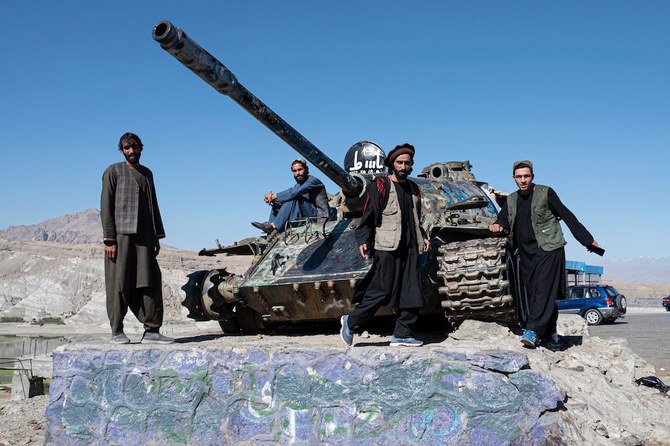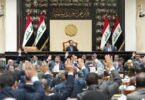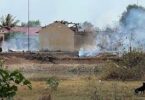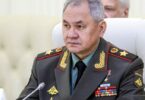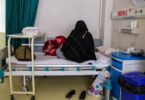LONDON: A senior British general has been accused by the BBC of hiding evidence of possible war crimes committed by UK Special Forces in Afghanistan.
Gen. Gwyn Jenkins, currently the British Armed Forces’ second most senior officer, allegedly placed evidence that Special Air Service personnel had carried out extrajudicial killings of handcuffed Afghan detainees and unarmed civilians in a “classified” dossier in 2011 rather than notifying the Royal Military Police.
The revelations come with a judge-led public inquiry currently investigating allegations of war crimes by British Special Forces in Afghanistan during the country’s occupation by coalition forces.
According to the BBC’s “Panorama” program, Jenkins, a Special Forces colonel at the time heading the Special Boat Service, locked a file with key testimony alleging crimes away in a safe after first notifying his senior officer, Gen. Jonathan Page, then-head of the Special Forces, in April that year. Within a month, Jenkins was promoted to head all UK Special Forces in Afghanistan.
In March 2011, “Panorama” claims, Jenkins was told by a junior SBS officer that he had held a conversation with an SAS colleague in which it was stated that SAS units in Afghanistan were killing unarmed people and executing detainees during night raids, specifically targeting “fighting-age males” deemed to be aged 15 years or older, regardless of whether they posed a threat.
Jenkins is alleged to have told the SBS officer to write a formal statement on the matter, in which the officer said it had been suggested to him that the SAS had planted weapons on bodies after killing people, and “in one case it was mentioned a pillow was put over the head of an individual being killed with a pistol.”
Upon receiving the dossier, “Panorama” said Jenkins informed Page of the matter under the subject line “ALLEGATIONS OF EJK (extrajudicial killings) BY UKSF (UK Special Forces).”
In the correspondence, Jenkins told Page that he had been aware of allegations against SAS personnel “for some time,” had heard rumors of “summary executions of supposed Taliban affiliates,” and added: “I have now been given more information of a nature which makes me seriously concerned for the reputation of (UK Special Forces).”
Jenkins said he felt “most strongly that thorough investigation is warranted” as an “unofficial policy” of killing males aged 15 and older appeared to have been employed repeatedly, and “in some instances this has involved the deliberate killing of individuals after they have been restrained by (the SAS) and the subsequent fabrication of evidence to suggest a lawful killing in self-defence.”
He concluded: “My instinct is that this merits deeper investigation, hopefully to put minds at rest … or at worst to put a stop to criminal behaviour.”
A day later, Jenkins set up a classified file known as a “controlled-access security compartment,” which limited access to the testimony to a handful of Special Forces senior officers, labeled: “Anecdotal evidence suggesting (extrajudicial killings) have been carried out by members of (the SAS) in Afghanistan.”
The official reason for doing so was that “dissemination of the information protected by this Compartment could cause severe damage to the reputation of (Special Forces), could prejudice further investigation, and could disrupt current operations.”
The existence of the dossier only became known to the RMP after a whistleblower informed officers four years later.
UK law states, under the 2006 Armed Forces Act, that any evidence of war crimes must be immediately handed to the RMP.
In response to Jenkins’ concerns, Page issued a review into SAS tactics and appointed a Special Forces investigator who, the BBC said, failed to interview any witnesses outside of the Armed Forces, and did not visit the sites of the incidents in question.
In his review, which was conducted over the course of just one week, the investigator — a Special Forces major who had recently led a squad in Afghanistan — found no major issues and his findings were subsequently signed off by the commanding officer of the SAS unit accused of carrying out the suspicious killings, according to court documents.
In 2020, during a case at the High Court brought by several families of Afghans killed in SAS night raids, Col. Robert Morris said the classification of the testimony by Jenkins had for years stopped the RMP accessing key evidence during its investigations.
“Panorama” previously reported that between December 2010 and May 2011, one SAS squadron was responsible for the deaths of 54 people in Afghanistan in what the BBC called “suspicious circumstances.”
In 2012, Jenkins returned to the UK to serve as military assistant to then-Prime Minister David Cameron until 2014.
That year, the RMP opened an investigation into the SAS squadron in question. No charges were brought.
RMP personnel told the BBC that during the investigation, officers were prevented from interviewing important witnesses or collecting forensic evidence. They were also told, they claim, to drop investigations into key suspects.
The Ministry of Defence told the BBC that it was fully committed to supporting the public inquiry launched in 2022, and that it would not be appropriate to comment on any allegations while the inquiry was ongoing.
Courtesy: arabnews

